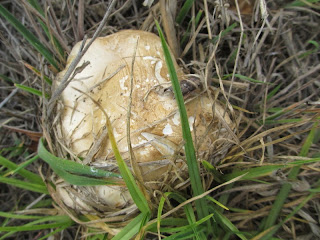I was at Mostert's Mill in Cape Town on Saturday and spotted this amongst the roses:
 |
Magpie Fungus Coprinopsis picacea from the top |
Here's another type of fungus we found on the farm. Colin Ralston on iSpot (kindly!) suggests it might be a Russula
In the unburned area, this Slangbos which I think is Stoebe plumosa / Seriphium plumosum was in flower with tufts of white fluff:
It looks as though the bunches of brown cones are buds which take turns to all open at the same time.
These Swollen Restio Beetles Pseudorupilia were at it again:
We're wondering about these Wachendorfias, with leaves growing radially, so curved and so close to the ground. Is it as a result of the fire, perhaps?
Dominic has suggested that this is re-growing Cape Myrtle Myrsine africana. He says the red stems help with diagnosis. These leaves look more spear-shaped than those on the web, so I'm not too sure.
This, again, looks different. We are going to have fun identifying them all!
It's disappointing to see these aliens growing in such profusion in the wetter spots. It's astonishing that the seeds are so prolific even so long after the introduction of biological controls! We pulled up hundreds, then gave up!
This had us confused, we even wondered if it was Eucalyptyus, but there was no smell from a crushed leaf.
It was growing in a carpet of yellow Oxalis, closed because it was gloomy.
The pods of these burned King Proteas Protea cynaroides are picture-perfect!
How's this for a row of Agapanthus walshii? It's as if they really needed a fire! There were perhaps 4 plants here before.
Still some way from home on the way back, we saw four white birds flying in to the dam on the experimental farm which is very empty at the moment. We thought they were Sacred ibis, but something didn't look quite right. Sure enough, three were Spoonbills!
Last week, on the bank we saw this fresh spoor; the lack of claw-marks makes it a dead ringer for the African Clawless Otter Aonyx capensis:
:-) A

















Birds add to interest,as do the fungi, the regrowth after the fire seems rather slow, could it be a lack of rain, I suppose you are lucky not to have buddleja or rhododendron or any other invaders about. Nice to see pieces of green though.
ReplyDelete